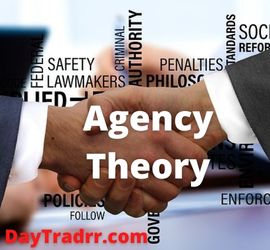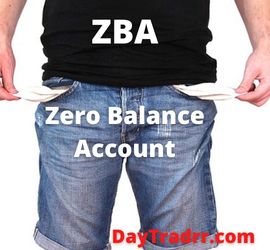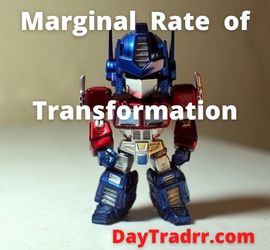What Is Agency Theory?
 Agency Theory describes how to effectively manage partnerships in which a principal specifies which job to undertake while an agent actually does it. In general, agency theory is used to understand and address problems in the connection between corporate owners and their agents. That connection is most typically between shareholders, as principals, and firm executives, as agents.
Agency Theory describes how to effectively manage partnerships in which a principal specifies which job to undertake while an agent actually does it. In general, agency theory is used to understand and address problems in the connection between corporate owners and their agents. That connection is most typically between shareholders, as principals, and firm executives, as agents.
According to agency theory, companies function as agents for their shareholders. That is, shareholders, engage in corporate ownership and thereby entrust their resources to the administration of the corporation’s directors and officers. In bigger organizations, there is frequently a substantial difference between executives’ and shareholders’ immediate and long-term interests. This is largely due to the short-term need for profits and earnings as well as the asymmetrical knowledge that officers and directors have in comparison to shareholders.
Agency Theory – A Closer Look
In general terms, an agency relationship is any connection between two parties in which one, the agent, represents the other, the principle, in day-to-day transactions. The agent has been employed by the principal or principals to provide a service on their behalf. Principals delegate decision-making responsibility to agents. Because the agent makes numerous financial choices affecting the principal, disagreements, and even divisions in priorities and interests, might occur. The interests of a principal and an agent are not necessarily aligned, according to agency theory. This is also known as the principal-agent issue.
An agent, by definition, uses the resources of a principal. The principal entrusts the agent with funds but has little or no day-to-day involvement. As a result, the agent makes the choice but bears less risk because any losses are carried by the principal. Financial planners and portfolio managers act as agents for their principals and are responsible for their assets. A lessee may be responsible for the protection and safekeeping of assets that do not belong to them. Despite the fact that the lessee is responsible for taking care of the assets, the lessee is less interested in preserving the items than the actual owners.
Principal-Agent Issue
A conflict of priorities exists between a person or group and the representative authorized to act on their behalf in the principal-agent issue. An agent may operate in ways that are detrimental to the principal’s best interests. The principal-agent dilemma is as diverse as the principle and agent positions. It can happen in any case where the owner of an asset, or a principal, transfers direct control of that asset to another person, or agent. A house buyer, for example, may assume that a realtor is more concerned with a commission than with the customer’s worries.
Areas of Dispute in Agency Theory
Agency theory explores the disagreements that originate largely from two factors. These are a difference in aims or a difference in risk aversion. For example, firm leaders may want to grow a business into new, high-risk areas in order to increase short-term profitability and remuneration. This, however, may offer an unjustifiable risk to shareholders, who are mainly concerned with long-term profits growth and share price gain. Another important problem frequently addressed by agency theory is conflicting risk tolerance levels between a principal and an agent. Shareholders at a bank, for example, may argue that management has set the bar too low for loan approvals, putting the business at too big a risk of default.
Agency Theory – Reducing Agency Loss
Proponents of agency theory embrace methods for resolving disagreements between agents and principals. This is referred to as reducing agency loss. The amount that the principal claims was lost as a result of the agent working against the principal’s interests is referred to as agency loss. Among these tactics is the provision of incentives to corporate executives in order to enhance the earnings of their principals. For example, stock options granted to firm leaders are based on agency theory. These incentives are designed to improve the interaction between principals and agents. Other strategies include connecting CEO pay to shareholder returns in part. These are some applications of agency theory in corporate governance.
However, concerns exist that management may jeopardize long-term firm growth in order to maximize short-term profitability and their personal remuneration. This is frequently observed in budget planning, as management cuts projections in yearly budgets to ensure that they achieve performance targets. These concerns result in yet another compensation structure in which CEO pay is partially postponed and set based on long-term objectives. These solutions are similar to those found in other agency interactions. One example is performance-based remuneration. Another option is to require the posting of a bond to ensure the delivery of the desired result. When all else fails, there’s the final option, which is to just fire the agent.
Agency Theory Examples
Agency theory can be readily recognized in many business relationships.
- Company Executives and Shareholders – By definition, the shareholders of a corporation are the firm’s owners. However, it is neither practical nor possible for all shareholders to operate the firm. Experienced managers and executives are required to handle the day-to-day operations efficiently. As a result, this task is assigned to a designated manager or CEO. The shareholders are the principals in this case, while the firm management is the agent. Essentially, there is a split of ownership and control. As a result, disputes between management and stockholders do develop. The management team may be pursuing its own objectives and ambitions at the cost of the shareholders. This is where agency theory enters the picture. It requires that all activities that are taken by the agents should be directed toward furthering the self-interest of the shareholders.
- Fund Managers & Investors – The investor-fund manager relationship is another illustration of agency theory in action. The principals of a fund are the investors, whereas the agents are the fund managers. Personal interests, such as substantial commissions, may be pursued by fund managers at the expense of investor interests. Agency theory is again used in this instance. It requires fund managers to behave as much as feasible in the best interests of the investors. In exchange, sufficient remuneration is structured into their compensation packages.
- Employees & Employers – The employer-employee connection is very similar to all of the preceding business relationships. Employees must behave in the best interests of their employers. In return, employers must guarantee that they are adequately rewarded.
Agency Theory and Corporate Governance
Agency theory is often used to analyze and explain corporate governance phenomena. This includes executive incentive alignment, board monitoring, and top management control. This area of study is grounded in economics and accounts for the majority of business and management research. However, other major principal-agent connections are observed in business and society. This includes politicians/voters, brokers/investors, and lawyers/clients. All these relationships have benefited from the huge body of research that has investigated the principal-agent relationship in numerous forms and circumstances.
Agency theory is commonly utilized to understand and explain corporate governance phenomena, including executive incentive alignment, board monitoring, and control of top managers; this strand of the literature is founded in economics and represents the bulk of the research in business and management. However, other important principal-agent relationships are commonly seen in business and society, such as with politicians/voters, brokers/investors, and lawyers/clients, and have benefited from the vast stream of research that has explored the principal-agent relationship in various forms and contexts. (Source: oxfordre.com)
Up Next: ZBA – What Is a Zero Balance Account?
 A ZBA (zero balance account) is a specialized business account. It is used to process payments like payroll or petty cash. Otherwise, a ZBA is kept with a zero balance. In other words, a zero balance account (ZBA) is precisely what it sounds like. It is a business checking account with a balance of zero. However, when funds are necessary, the precise amount required is transmitted automatically from a central or master account. Deposits are also swept into the main account on a daily basis. Corporations may employ zero balance accounts to guarantee that money is easily available across departments. However, it removes surplus balances in separate accounts and keeps greater control over cash disbursement. For example, payroll, petty cash, and other related needs are handled via these accounts.
A ZBA (zero balance account) is a specialized business account. It is used to process payments like payroll or petty cash. Otherwise, a ZBA is kept with a zero balance. In other words, a zero balance account (ZBA) is precisely what it sounds like. It is a business checking account with a balance of zero. However, when funds are necessary, the precise amount required is transmitted automatically from a central or master account. Deposits are also swept into the main account on a daily basis. Corporations may employ zero balance accounts to guarantee that money is easily available across departments. However, it removes surplus balances in separate accounts and keeps greater control over cash disbursement. For example, payroll, petty cash, and other related needs are handled via these accounts.
The account’s surplus balance is transferred to a master account on a daily basis. Also, numerous zero balance accounts (or sub-accounts) may flow into the same master account. If the ZBA needs money, the exact amount can be transmitted automatically and then wired to the proper recipient. In this way, it keeps the account’s running balance at zero. As a result, these types of accounts are only used to process payments. They are not designed to be savings accounts or to earn interest.




